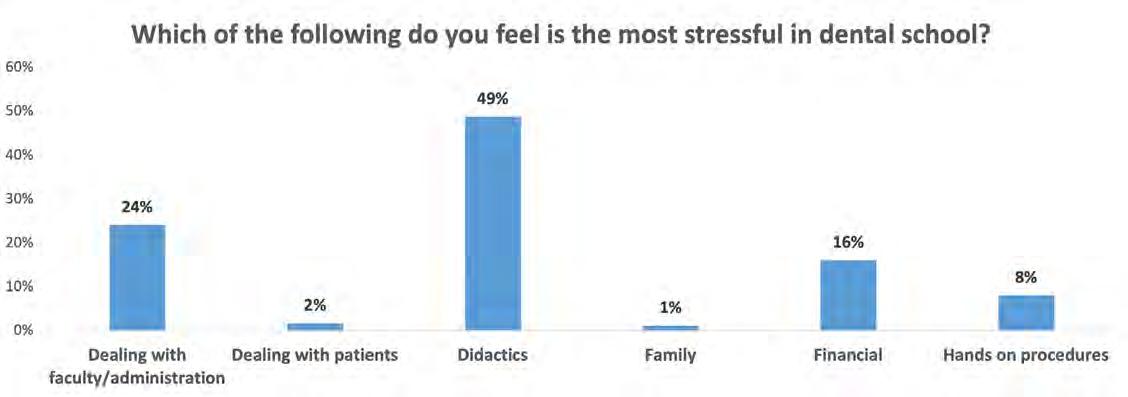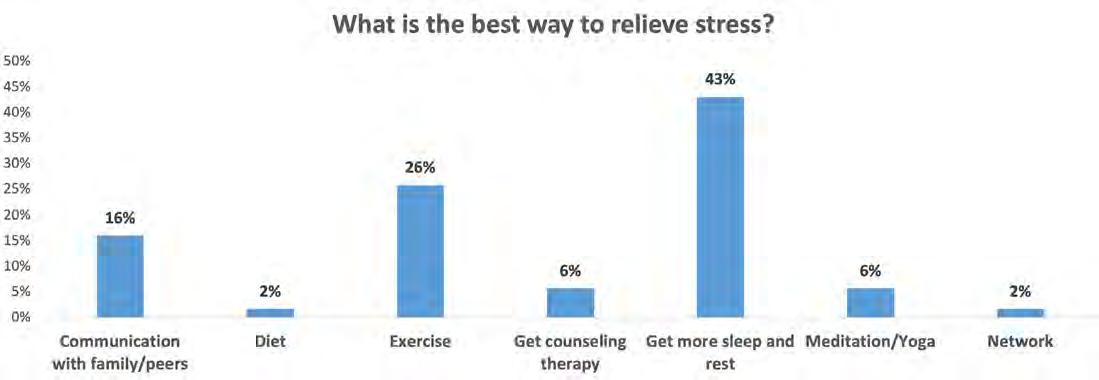
10 minute read
Stress of Dental Students
Stress of Dental Students
Ellen Lee, D.D.S.; Ningshu Lyu, D.D.S.; Yixin Bao, D.D.S.; Yutong Fan, D.D.S.; Yueqi Gao, D.D.S.; Bryan Gu, D.D.S.; Vicky Quach, D.D.S.
ABSTRACT
The purpose of this study is to assess what factors cause the most stress for students in dental school and to evaluate different ways to reduce stress. Our aim is to analyze the factors causing stress and offer strategies to help students overcome it.
Stress is a response to change when someone is under pressure or feels overwhelmed with a situation. Dental students have many causes of stress. These include learning didactics and hands-on skills, finances, family, dealing with patients, and dealing with faculty and administration. In addition, students are also concerned about graduation requirements and have long working hours. Many dental students strive for excellence and perfection, which can also increase stress.
Methods
The study was approved by the Institutional Review Board of New York University College of Dentistry (IRB-FY2022-6690) with exempt status. An eight-question survey was sent through Surveys (Qualtrics) to first-, second-, third- and fourth-year students (D1, D2, D3, D4) at New York University College of Dentistry. This voluntary, anonymous survey asked the students what year of dental school they were in and their gender. They were asked: which was most stress-
ful in dental school, what caused more stress in learning, which was more stressful in dealing with patients, which was more stressful—choice of four—and what was the best way to relieve stress. A total of 174 students responded to the survey. Each class has over 300 students.
Results
Nearly half (49%) of the total number of students felt that didactics were the most stressful in dental school (Figure 1). Eighty-two percent of the total number of students felt that didactics were more stressful in learning compared to hands-on procedures (Figure 2). In terms of patient interaction, 52% of the total number of students felt that treating patients was most stressful (Figure 3). Sixty-two percent of the total number of students felt more stress interacting with faculty and administration compared to family, patient and peer interactions (Figure 4). And 43% of the total number of students felt that the best way to relieve stress was to get more sleep and rest (Figure 5).
In our survey, 59% of the respondents were female, 39% were male and 2% preferred not to provide their gender. The 174 students who participated in the survey were from all four of the classes; about 28.7% were D1, 23% D2, 30.4% D3 and 17.8% D4. Although only about 15% of each class responded to the survey, we did get a good distribution of responses across all classes.

Discussion
The didactic part of dental education is very stressful. Examination and grading are factors that cause stress. In our survey, 49% of the total number of students felt that didactics were the most stressful in dental school (Figure 1). This is similar to previous reports from Elani and Basudan.[1,2] Elani[1] reported that academics were more stressful in preclinical years compared to clinical years. Narwal[3] reported that “examinations and fear of failure” were major stressors in dental students at the University of Birmingham and University of Hong Kong. In addition, when compared with hands-on procedures, 82% of our students felt that didactics were more stressful (Figure 2).

Preclinical students in particular are most stressed about examinations and grades since they are afraid of failing the course or having to repeat the academic year. The transition from undergraduate to dental school education can be challenging. There are more classes in one semester requiring student participation, and each of these classes requires learning much more information in a short amount of time. Schools could offer support, such as counseling services, to those in need and provide peer tutoring services to students who are struggling with their courses to help alleviate their stress levels.
Hands-on procedures are an essential part of dental education. Ahmad[4] reported that students had difficulty learning manual skills, and this was noted more in senior students. Long-term, hands-on procedures caused almost 79% of dental students to experience pain, with nearly half of them experiencing pain for more than 30 days a year.[5] Teaching students good working posture while treating patients should develop during dental training. Students in our study considered hands-on procedures less stressful than didactics (Figure 2).
Dealing with patients can create much stress. Most students reported stress during pediatric patient care and panic attacks while performing dental treatments such as extractions or administering local anesthesia.[6] Regular practice can decrease the anxiety of dealing with these patients. In our study, 52% of students felt treating patients was the most stressful part of dealing with patients (Figure 3).

Henzi[7] reported a survey evaluating the effectiveness of clinical instruction in dental schools in North America. The top four concerns were: patronizing and inconsistent feedback from faculty; too many miscellaneous tasks, including billing, scheduling, paperwork and other operations tasks; insufficient access to faculty feedback due to staff shortage; and ethically questionable strategies employed to meet procedural requirements.[7] Relationships with faculty greatly influence students’ learning experience. Faculty can collaborate with educational specialists on strategies to improve student performance without causing stress. As shown in Figure 4, interaction with faculty/administration (62%) was more stressful than other interpersonal interactions in our study.

Since dental schools are quite expensive, this is, undoubtedly, one of the worries that the majority of dental students have. Students often finance through federal or bank loans. One study from Britain found students with greater debt identified with a greater amount of stress and concern about paying back their debts, while students getting financial support from families reported having less stress.[8] Our study showed 16% of students felt finances were the most stressful in dental school (Figure 1).
According to medical and mental health specialists, physical activity, balanced nutrition and adequate sleep can boost mental health and wellness. The evidence is multifaceted, encompassing both neurological and psychological systems.[9] Two stress-relief techniques are yoga and meditation. A study of Indian students who did yoga prior to their first periodontal surgical procedure showed significant reduction in their anxiety state from the control group.[10] Practicing meditation was found to be effective at reducing symptoms of stress and enhancing mental and physical well-being in undergraduate dental education.[11]
Meira[12] found that perceived stress may be a predictor of lower quality of life and that more hours of sleep could help dental students relieve their pressures. Our study found 43% of the total number of students felt the best way to relieve stress was to get more sleep and rest (Figure 5). The study by Choi[13] noted the perception of not enough sleep may increase awareness of stress. Getting enough sleep prepares the body to tackle the stress that comes with the day and enhances learning abilities. The recommended duration of sleep is seven to nine hours.[13]

Counseling therapy provided by psychiatrists and artificial intelligence (AI) may effectively identify the root cause of stress at an earlier stage and help with treatment.[14] AI shows promise in healthcare, but is still in preliminary stages.
Limitations of the study include the small number of total responses relative to the class sizes and that the survey was given at one institution. However, there were responses from each class. We did not inquire about possible stress related to students’ personality and living situation, but mainly surveyed stress related to learning in dental school. For the future, we will look to see if there is a difference in causes of stress between preclinical versus clinical years.
Stress can have a detrimental effect on both physical and mental health. To succeed in dental school, it is crucial for students to learn to relieve stress themselves. Overall, students felt that didactics (82%) and interaction with faculty and administration (62%) were the most stressful in dental school. Most students felt the best way to relieve stress was to get more sleep and rest. (43%)
Dental school is extremely competitive in terms of successfully applying and doing well once students are in, and the stress level intensifies with years of study. Dental students should be aware of their stress, as it can negatively impact their mental health, and identify stress management strategies that best suit them.
All authors have disclosed no relevant relationships. Queries about this article can be sent to Dr. Lee at el84@nyu.edu.
REFERENCES
1. Elani HW, Allison PJ, Kumar RA, et al. A systematic review of stress in dental students. Journal of Dental Education 2014;78 (2):226-422.
2. Basudan S, Binanzan N, Alhassan A. Depression, anxiety and stress in dental students. International Journal of Medical Education 2017;8:179-186.
3. Narwal S, Narwal P, Leung YY, et al. Stress and work-life balance in undergraduate dental students in Birmingham, United Kingdom and Hong Kong, China. Journal of Dental Education 2021;85(7):1267–1272.
4. Ahmad MS, Yusoff MMM, Razak IA Stress and its relief among undergraduate dental students in Malaysia. The Southeast Asian Journal of Tropical Medicine and Public Health 2011;42(4):996-1004.
5. Vijay S, Ide M. Musculoskeletal neck and back pain in undergraduate dental students at a UK dental school--a cross-sectional study. British Dental Journal 2016;21(5):241–245.
6. Aishwarya AS, Gurunathan D. Stress level in dental students performing pedodontic procedure. Journal of Advanced Pharmacy Education and Research 2017;7(1):34–38.
7. Henzi D, Davis E, Jasinevicius R, et al. North American dental students’ perspectives about their clinical education. Journal of Dental Education 2006;70(4):361-377.
8. Boyles J D, Ahmed B. Does student debt affect dental students’ and dentists’ stress levels? British Dental Journal 2017;223(8):601-606.
9. Hosker DK, Elkins RM, Potter MP. Promoting mental health and wellness in youth through physical activity, nutrition, and sleep. Child and Adolescent Psychiatric Clinics of North America 2019;28(2):171–193.
10. Shankarapillai R, Nair MA, George R. The effect of yoga in stress reduction for dental students performing their first periodontal surgery: a randomized controlled study. Int J Yoga 2012;5(1):48–51.
11. Colley J M, Harris M, Hellyer P, et al. Teaching stress management in undergraduate dental education: are we doing enough? British Dental Journal 2018;224(6):405-407.
12. Meira TM, Ronsani MM, Ignácio SA, Miyoshi, et al. Predictors of perceived stress and quality of life amongst dental master and doctoral students. European Journal of Dental Education 202327(1):19-28.
13. Choi DW, Chun SY, Lee SA, et al. Association between sleep duration and perceived stress: salaried worker in circumstances of high workload. International Journal of Environmental Research and Public Health 2018; 15(4):796.
14. Graham S, Depp C, Lee EE, et al. Artificial Intelligence for Mental Health and Mental Illnesses: an Overview. Current Psychiatry Reports 2019;21: 116.
Ellen Lee, D.D.S., is clinical assistant professor in the Department of Cariology and Comprehensive Care, New York University College of Dentistry, New York, NY.
Ningshu Lyu, D.D.S., is a graduate of New York University College of Dentistry, New York, NY.
Yixin Bao, D.D.S., is a graduate of New York University College of Dentistry, New York, NY.
Yutong Fan, D.D.S., is a graduate of New York University College of Dentistry, New York, NY.
Yueqi Gao, D.D.S., is a graduate of New York University College of Dentistry, New York, NY.
Bryan Gu, D.D.S., is a graduate of New York University College of Dentistry, New York, NY.
Vicky Quach, D.D.S., is a graduate of New York University College of Dentistry, New York, NY.










